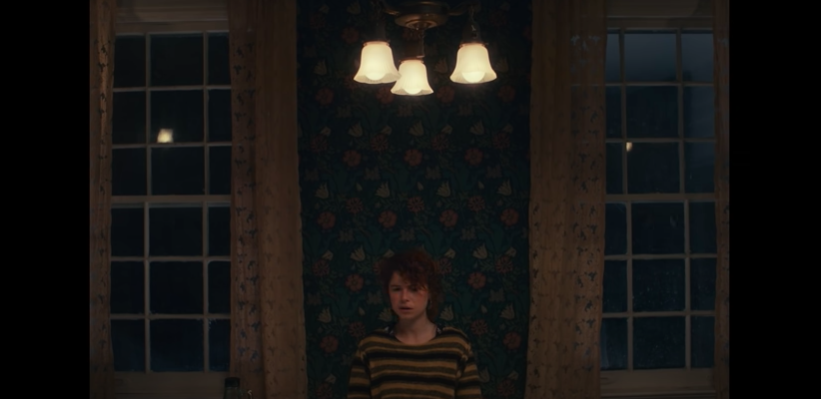After I finished I’m Thinking of Ending Things, I couldn’t help but imagine a sans-coronavirus timeline where I watched the Netflix film in a packed movie theater. I’m certain that, the instant those final credits pop up on the screen, the entire audience would experience a collective “huh?” moment.
It shouldn’t come as a surprise — director Charlie Kaufman has written surreal dramas such as Eternal Sunshine of the Spotless Mind, Being John Malkovich and Synecdoche, New York. I didn’t expect a huge wave of clarity the moment I finished watching his latest project.
Based on a 2016 novel of the same name by Iain Reid, I’m Thinking of Ending Things follows a young woman and her boyfriend on their way to meet his parents for the first time. What’s normally seen as a milestone for couples is clouded by the young woman’s intrusive thoughts about ending their relationship. The girlfriend, played by Jessie Buckley, is sometimes referred to as Louisa or Lucy throughout the film, but simply listed in the credits as “young woman.”
The film opens with this young woman’s monologue of uncertainty. These emotions grip you for the rest of the film, as you’re immediately hit with the weight of keeping an ugly secret.
Kaufman does an excellent job of stretching this tension out with a running time of two hours and 14 minutes. There are only a handful of different settings, making each scene a bit long-winded. But, for the most part, it works. It encouraged the same uncertainty in the viewer as the young woman — at no point did I have a clear idea of what could happen next.
[Bella Thorne’s OnlyFans backfired, fast]
I’m Thinking of Ending Things is a tasteful thriller. Kaufman worked in elements of suspense with unconventional techniques. There was a recurring theme of smaller, insignificant moments lasting far longer than they should have.
When the young woman and her boyfriend, Jake (Jesse Plemons), finally arrive at his parents’ secluded farmhouse, the pair spot Jake’s mother looking at them from an upstairs window. They take turns waving back and forth for an obscene amount of time — laying the groundwork for an out-of-the-ordinary first dinner together.
This pattern continues when Jake introduces his girlfriend to the family dog. The border collie shakes off his wet fur from the blizzard outside as if he’s glitching. This odd behavior is swiftly pushed aside as Jake’s parents make their way downstairs to greet their son’s girlfriend.
Jake’s mom is played by Toni Collette, who’s known for her powerful performance in the horror drama Hereditary. The moment I learned she was a part of this questionable family dynamic, I knew I was in for an offbeat experience.
Collette’s quirks as Jake’s mother were on full display. At first glance, she appears as the jumpy mother who’s just thrilled that her son is finally in a relationship. But as the night goes on, you begin to realize something much more unnerving is happening.
[Review: ‘Midnight Sun’ can bite me]
As I attempted to parse the greater messages portrayed in this film, the concept of aging felt like its most prominent theme.
Throughout this never-ending night at the farmhouse, both Jake’s mother and father noticeably age. It starts out subtly — the father’s hair has grayed and his foot injury is harder to ignore. The mother’s ear condition also worsens as the night goes on, with Collette mimicking the grating hissing sound only she can hear.
The more the young woman pleads with Jake to go home, citing her enormous workload the next day, the more age plays a role. Suddenly Jake’s mother was in her 90s, needing to be spoon-fed by her son. Just a few moments later, the young woman runs into Jake’s mother from decades before, cleaning up her son’s toys.
While most of the film either focuses on the drive to and from the parents’ house or the dinner itself, shots of a janitor working at the high school Jake went to are scattered in between.
In an interview with Rotten Tomatoes, Kaufman explained that his film focused much more on the high school than Reid’s book did. Because of this, he went on to flesh out the storyline of the students being involved in a performance of the musical Oklahoma!
Kaufman was interested in a film adaptation of Reid’s book because he liked the “dreaminess” of it, which he said in the same interview.
Kaufman effectively transferred that dreaminess over to his film. Any moment you think you’ve developed some semblance of an understanding, the story takes a sharp turn. The dream-like dance sequence to music from Oklahoma! felt like an homage to the instrumental “dream ballet” that occurs in the musical.
This surreal dance break was one of many moments in the final 20 minutes that made one thing extremely clear to me: I know a lot less than I thought I did. Jarring moments like these came at times when I expected closure to the story.
Uncovering the meaning in I’m Thinking of Ending Things was an extreme mind exercise. This film is an experience that lasts longer than the two hour run time. You’ll hold onto it afterward, attempting to decipher what different stylistic choices meant. You could probably watch it a dozen more times and learn something new every time.



